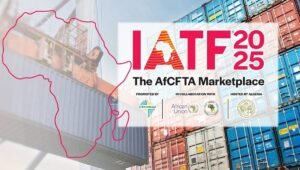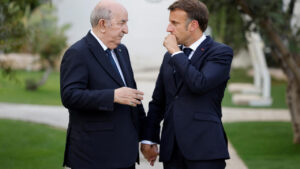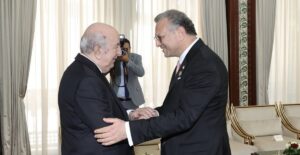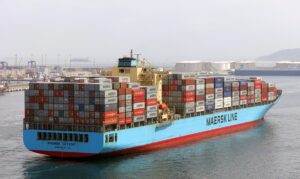Map of the risks threatening the Algerian regime in 2025!

The year 2024, which we bid farewell to a few days ago, witnessed numerous regional and international changes that require various countries and regimes to prepare for further threats and opportunities during the current year, if they are to survive and secure their homelands from what is to come. No country in the world, large or small, is immune from these threats and opportunities, making this year a pivotal year in every sense of the word. Perhaps the most prominent of these changes, which are likely to have an impact—negative or positive—on various countries in the region, can be cited, but are not limited to: the fall of the tyrant Bashar al-Assad; the steadfastness of the Palestinian resistance and its success in forcing Israel to accept the agreement it had rejected for eight months; the return of US President Donald Trump to the White House; the clear catastrophic consequences of climate change globally and regionally; and finally, the world is preparing to enter a period of turmoil and confrontation between the new US administration and the rest of the great powers, which could escalate into a trade war based on mutual tariffs, with the entire world involved.
However, in this article, we will only address the most prominent challenges and opportunities facing the Algerian regime—as an example—which could threaten its very existence. The choice of Algeria over others stems from the regime's "ossified" and closed nature, due to its military dominance, and its lack of the flexibility to deal with crises in a way that mitigates their negative impact. Given the near-total absence of opportunities for the generals' regime in 2025, we will review the most prominent challenges (risks) that could affect the regime's existence and continuity. We will divide them into internal and external challenges, with the difficulty of separating the two categories.
The most prominent internal challenges are the power struggles between the various factions within the Algerian regime, particularly among the regime's generals who control its internal affairs. These struggles have intensified with the accelerating attempts of strongman General Said Chengriha, the Chief of Staff and de facto Minister of Defense, to marginalize all those he considers to be outside his immediate circle of loyalty and appoint replacements from within his inner circle. This has so far led to the dismissal of Generals Djebbar Mehna, Amar Athamnia, and Ben Ali Ben Ali. Given the “mafia” nature of the regime, this fierce war launched by Chengriha leads to two contradictory possibilities, one of which cannot be decided with certainty: Either everyone pledges loyalty to the new master, and all the generals who oppose him are eliminated completely, which is the weakest possibility, by the way, or his opponents and victims succeed in getting rid of him, and a new round of counter-eliminations begins. In both cases, this declared war between the generals certainly weakens the regime, and even makes its fate and very continuity highly questionable.
The second challenge posing a threat to the Algerian regime is the possibility of a popular uprising returning to the streets, given the multifaceted state of tension that President Abdelmadjid Tebboune's acrobatics have failed to address or mitigate. This possibility derives its credibility from two external threats: the success of the Syrian revolution in ending the rule of Bashar al-Assad's "mafia," which had always sought to appear strong and cohesive. Its fall within 11 days was a resounding surprise to many, causing clear panic among the generals, with the famous refrain being repeated: "Syria is not Algeria!" The other external threat, primarily linked to the return of President Trump, is the potential "collapse" of oil and gas prices, as a result of unleashing American oil extraction. This would cause a "catastrophic" liquidity crisis for the Algerian regime, rendering it unable to "buy" civil peace through an initiative here or there. Whether the movement stems from increased repression and the denial of freedoms, or from the continued failure to provide basic necessities for Algerian citizens, it represents one of the most significant threats to the military regime in Algeria.
Turning to the external threats facing the military regime in Algeria, the most prominent of these can be summarized as four: the first is a clash with the United States under Trump, given the Algerian regime's complete dissonance with the new administration's vision of the situation in various regions of the world. The Algerian regime, accustomed to trying to play on the various French, Russian, American, and Chinese sides, now faces a difficult choice: submit to Russia's demands to establish a military base that would compensate for the loss of Syria and secure the presence of its forces in Algeria's surrounding areas (Niger, Libya, and Mali), or comply with US demands to freeze or cancel announced arms deals with Russia (Su-57 aircraft, for example), abandon the terrorist Polisario Front, sever ties with Iran, and other conditions. These are two bitter choices, and a regime as fragile as that of the generals cannot bear the consequences of taking either. The question of the potential impact of this impasse remains, depending on the extent of the American and Russian insistence on the Algerian generals taking a decisive stance, and the extent of the regime's leverage to stand between the two sides, while refraining from angering either, and appeasing each in a way that doesn't provoke the other! The second external threat is facing the inevitable collapse of the Polisario, and Morocco achieving its goal of expelling the "Tindouf Republic" from the African Union, closing the file at the UN, and thus ending the "lie" in which the Algerian military regime squandered billions of dollars of the Algerian people's resources over more than half a century, and because of which it severed the Maghreb Union over more than three decades. How will the Algerian regime market this defeat to its citizens? In connection with this point, two threats emerge. The first is the complete isolation of the Algerian regime within its Arab and regional environment, due to the stubbornness of the Algerian generals in violating the positions and agreements agreed upon by Arabs and Africans, including their complete and clear rejection of the Algerian regime's support for separatist movements in its immediate and distant neighborhood. The second threat is the "explosion" of Algeria's borders, forcing the army to engage in military skirmishes on multiple fronts, specifically in Mali, Libya, Mauritania, and Niger. This would expose Algeria as a whole to the risks entailed by severing its ties with its Maghreb and African surroundings and completely closing its borders with neighboring countries.
To summarize, 2025 appears to be a year full of challenges and threats for the Algerian military regime, with no real opportunity to strengthen its standing with local public opinion and support its false propaganda aimed at anesthetizing the Algerian people and postponing their decisive "resurrection." Perhaps the common element among these threats, which turns them into real dangers, is the nature of the military regime, which has not witnessed any significant modernization over the years of its artificial independence from France. Therefore, it is fair to say that this regime has taken more than one chance and ruled for far longer than it deserved. Here, perhaps it is useful to conclude with a paradox, based on the common characteristics between the Syrian and Algerian regimes, and strengthening the Algerian people's hope for imminent "liberation" from this regime. This is because the two regimes were established almost simultaneously (the rule of the generals began in 1962, and the rule of the Baath Party began in 1963). Perhaps the fall of the former heralds the fall of the latter, and the free people of Algeria will breathe the same breezes of freedom that the free people of Syria are currently breathing!





